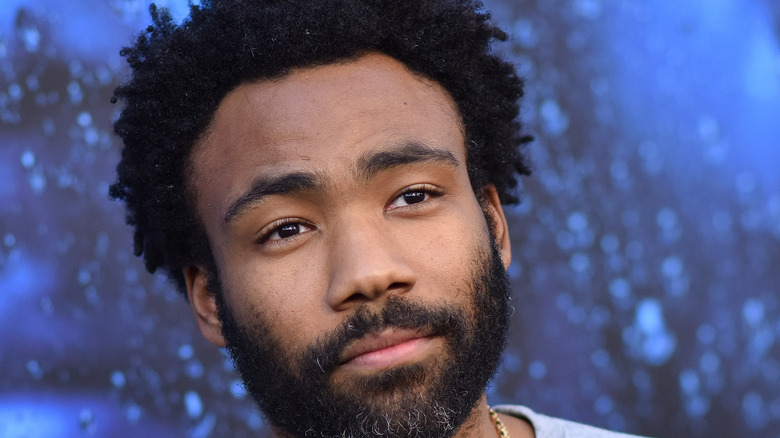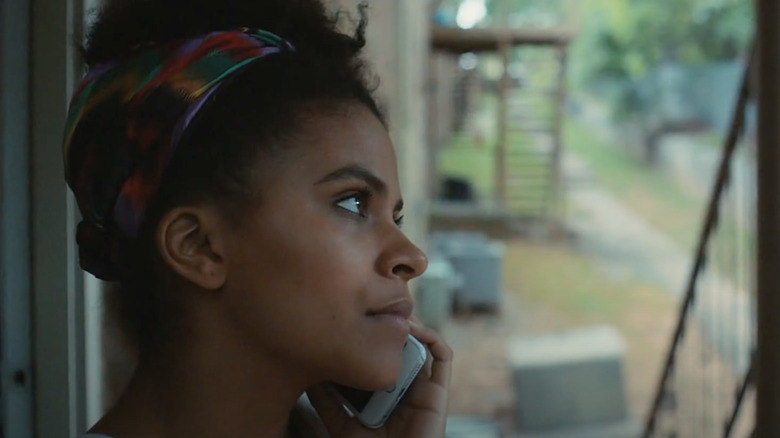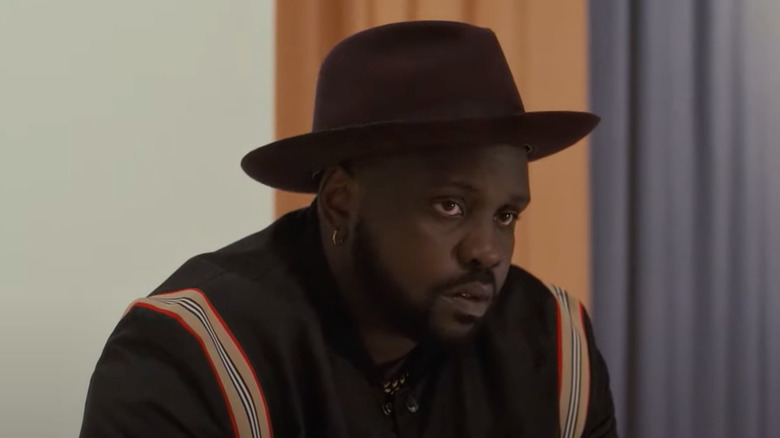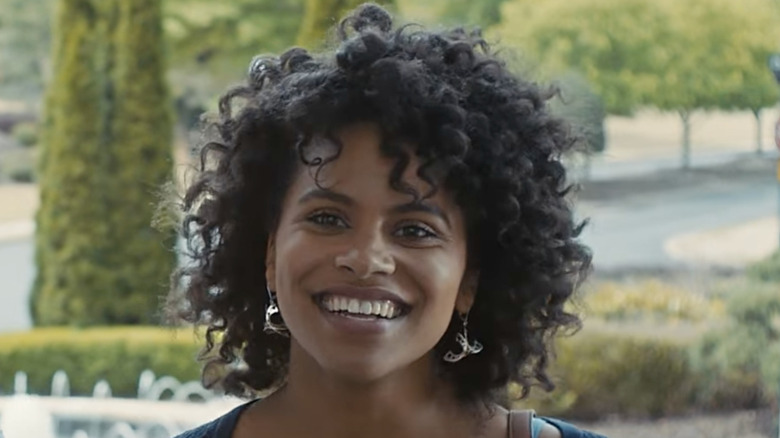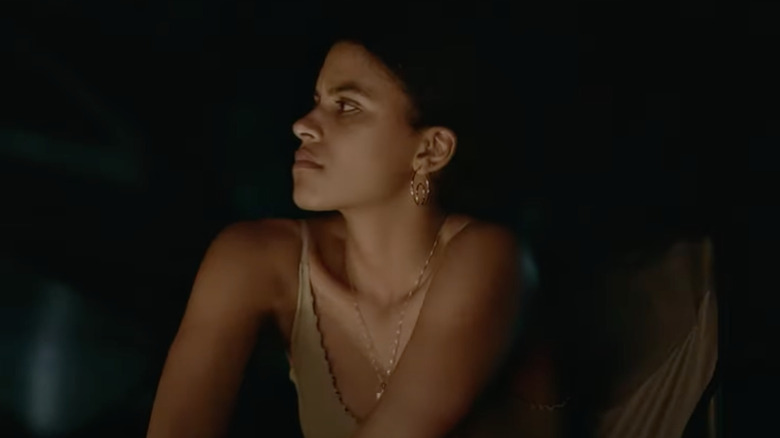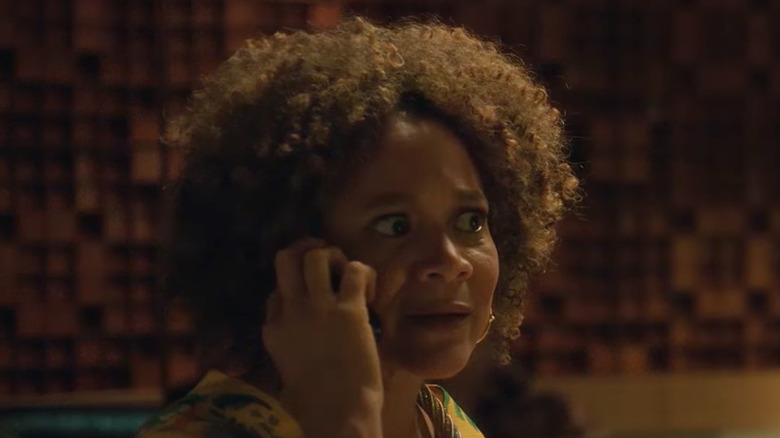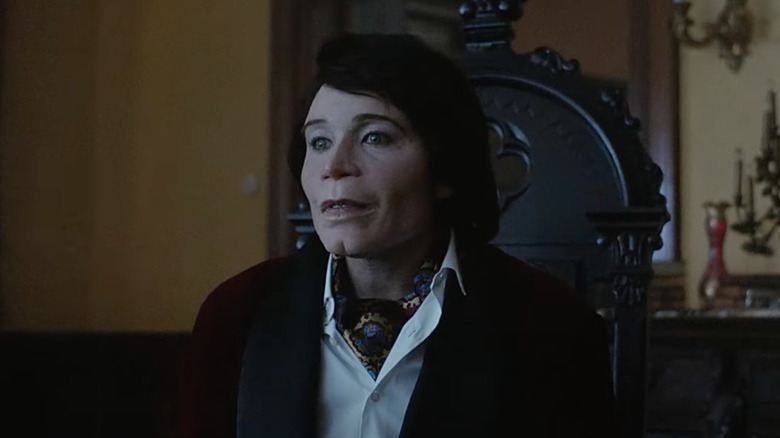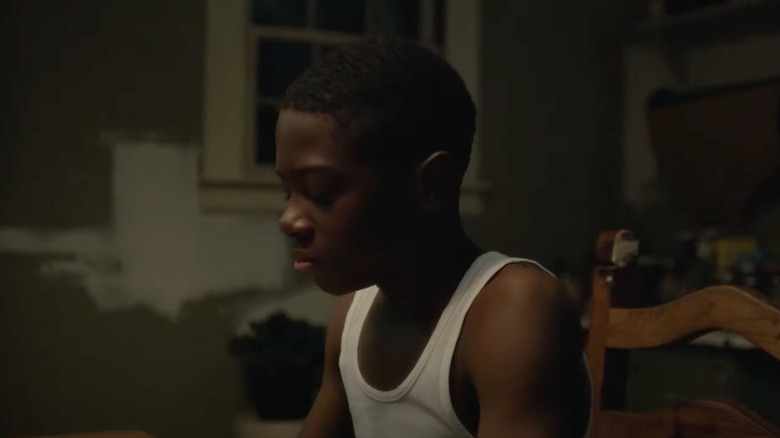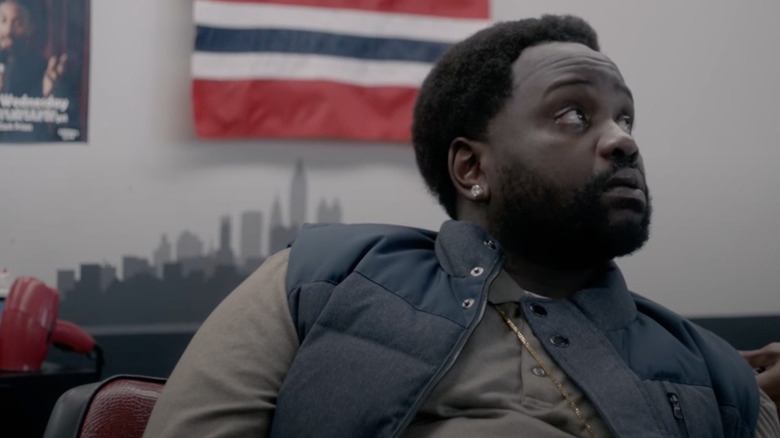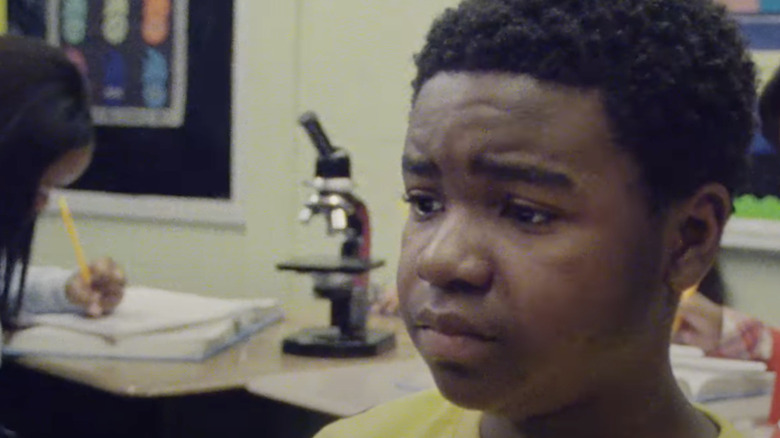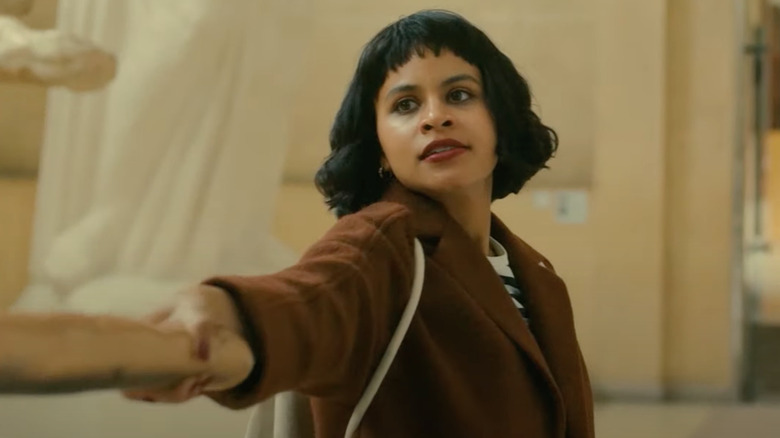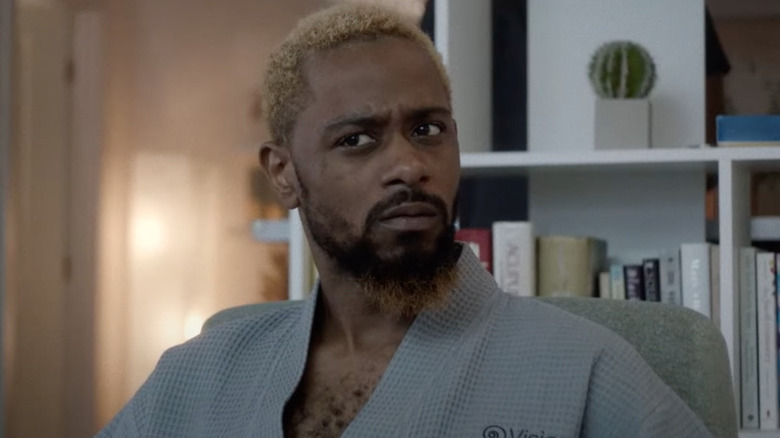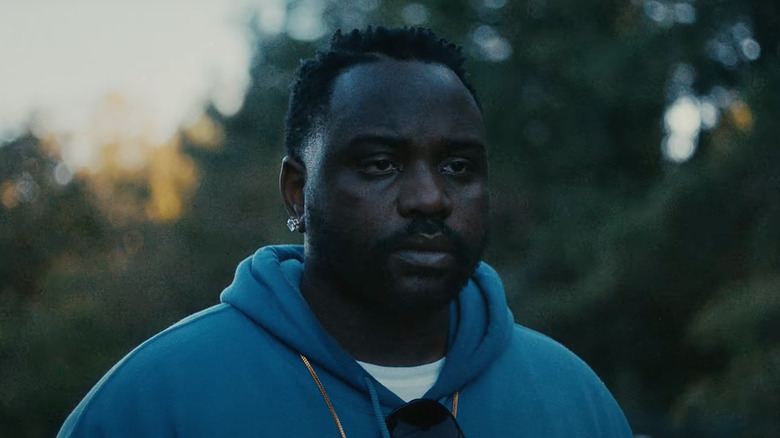The Best Episodes Of Atlanta, Ranked
After four seasons, FX's landmark series "Atlanta" has come to an end. The Emmy-winning surrealist comedy was created by Donald Glover, who, in addition to writing and directing duties, stars as Earnest "Earn" Marks, a young man who returns home to Atlanta after abruptly dropping out of Princeton University. Earn is strapped for cash, but finds work managing the career of his cousin Alfred Miles (Brian Tyree Henry), a rising local rap artist who goes by "Paper Boi" and is tagged around by his philosophizing pal Darius (Lakeith Stanfield).
Earn juggles his managerial duties with an on-again, off-again relationship with his girlfriend Van Vanessa "Van" Kiefer (Zazie Beetz) and his co-parenting responsibilities for his daughter Lottie (Mia Atehortua).
Over the course of the 41 mind-bending, beguiling, and often challenging episodes, "Atlanta" boldly experiments with tone and structure while cementing its legacy as one of the best television series of all time. The show thoroughly exploded the conception of what a comedy series could look like and achieve in 30 minutes. It will be sorely missed. Pretty much every episode is good — the lowest IMDb rating of the series is a still-impressive 7.3 — but several are truly outstanding. Here are the series' 12 best episodes, ranked.
12. Season 1, Episode 6 — Value
"Value" is the first of several excellent Van-centric chapters of "Atlanta." This episode gives us a deeper look into Van's identity through her strained friendship with her wealthy friend Jayde (Aubin Wise), who is in town visiting an NBA player she is cozying up to.
Moments into their dinner together, Van and Jayde regress into their sisterly dynamic, with Jayde nagging Van about going to her hairstylist and taking charge of ordering the wine. Van and Jayde's increasingly hostile bickering makes it clear that these two old friends are at very different stages in their lives and they might not be best for each other anymore. When Jayde cites Van's ongoing relationship with Earn as evidence that she does not know her value as a person, an infuriated Van almost abandons the girls' night, but Jayde lures her back with a joint and they squash their problems.
The next day, Van frets when she is informed she needs to take a drug test at work. She reaches out to Jayde and then Alfred for guidance, but nobody is able to help. In an act of disgusting genius, Van siphons urine from Lottie's dirty diapers to pass as her own but accidentally spills the sample. Eventually, Van comes clean to her boss, admitting she smoked weed, but her honesty gets her fired. This episode puts Van through the wringer, testing her patience, resilience, and self-worth. It is tough to see her struggle, but "Value" makes Van value herself more moving forward, and, for that alone, "Value" is a vital "Atlanta" episode.
11. Season 3, Episode 8 — New Jazz
"New Jazz" starts innocently, finding Earn, Al, and Darius in a casual Amsterdam cafe, still on Al's European tour. Earn treats Al and Darius to a reprieve with passes to a bougie spa after stressful, demoralizing travails in "Cancer Attack" and "White Fashion." En route to the spa, Al and Darius take a detour at a coffee shop to procure THC-laced space cakes.
Once Al and Darius lose each other deep in Amsterdam's infamous Red Light District, the episode spirals deep into surreality. We stick with Al as he evades a pack of brute young men who recognize him on the street and seeks shelter in the middle of what turns out to be an art performance at a gallery. He strikes up a flirtatious, if abrasive, conversation with theater-goer Lorraine (Ava Grey), who chastises him for not knowing who owns the rights to his masters, the original sound recordings of his music library. When Lorraine takes Al to "Canceled Club," he is shocked to find Liam Neeson (playing himself) at the bar. The two share a conversation in which Neeson doubles down on the real-life racist remarks he made in a 2019 interview with The Independent. At heart, "New Jazz" is an indictment of Al's complicated, frequently laissez-faire relationship with his fame. The morning after, his hallucinatory journey proves quite sobering.
10. Season 1, Episode 9 — Juneteenth
Earn wakes in a huff, having overslept at a hookup's house. Van spares him the walk of shame by retrieving him at the hookup's house and they hit the road, bickering along the way. We have no idea where they are headed; the only clue is Van saying "Monique is good for me." Like the best episodes of "Atlanta," we are thrust into the story without hand-holding and are expected to be smart enough to catch up.
When they arrive at an impressive estate, it is revealed that they are attending a Juneteenth celebration hosted by the revered socialite Monique (Cassandra Freeman). Van has roped Earn into posing as a happily married couple to get into the good graces of Monique, who wants to take Van under her wing and help her prosper. Meanwhile, Monique's white husband Craig (Rick Holmes) latches on to Earn, quoting Malcolm X, chastising him for never having visited Africa, and performing slam poetry about Jim Crow. Van and Earn are forced to give up the act when partygoers recognize him as Alfred's manager, dispelling Monique's haughty conception of them as a strait-laced couple. "Juneteenth" is a hilarious comedy of errors that reaches the absurdist heights of an Edward Albee play.
9. Season 4, Episode 7 — Snipe Hunt
While the fourth season of "Atlanta" may not be as subversive as the third season with its anthology episodes, it still feels impossible to predict what kind of show you are going to get. The one consistency in the fourth season, however, is that, with each passing episode, Earn reveals his vulnerability. This is largely thanks to the breakthroughs he experiences in therapy in the season's earlier episode "The Homeliest Little Horse."
In "Snipe Hunt," Earn pulls out all the stops for his camping trip with Lottie and Van, renting an entire campground with a 12-person tent. "Snipe Hunt" unfolds like an indie movie with a delicate tone and unhurried pace that feels more interested in character than plot. While hiking and exploring nature with Lottie, Van and Earn dance around the big question on their minds and those of viewers as "Atlanta" inches closer to its series finale: Will Van and Lottie move to Los Angeles with Earn? Things finally come to a head when Earn wakes up in the middle of the night unable to get warm in the supersized 12-person tent. He gets physically and emotionally close to Van, gauging where she is at with the idea of moving. He levels with her, saying that he wants them to be a family together in Los Angeles. Van is initially reticent, convinced that Earn is more in love with the idea of her as Lottie's mother than her herself, but Earn proves he loves Van for being Van. For the first time in four seasons, "Snipe Hunt" finds Earn and Van decidedly on the same page and on the same path moving forward.
8. Season 4, Episode 4 — Light Skinned-ed
Now four episodes into the fourth season, the European jet lag from whirlwind Season 3 has finally worn off and we have been firmly settled back in Atlanta. "Light Skinned-ed" finds Earn in his Sunday best at his parents' house, about to join his mother Gloria (Myra Lucretia Taylor) for church, which his father Raleigh (Isiah Whitlock Jr.) is skipping to enjoy three hours of peace at the mall while all the kids are at service.
The episode takes a turn when Gloria tells Earn she is planning on kidnapping his Grandpa (Bob Banks) from his Aunt Jeanie (Michole Briana White), who she believes is taking care of Grandpa to pocket his Social Security checks. When Gloria makes good on her word, Aunt Jeanie loses her cool and unearths decades of rich family drama between the siblings. Meanwhile, Raleigh's sacred mall ritual is disrupted when a compliment-dispensing saleswoman convinces him to buy an eccentric hat, which leads to him getting teased by a cruel kid. The most exceptional part of "Light Skinned-ed" is how seamlessly it unites its A and B stories in a heartbreaking climax over something as seemingly insignificant as bread.
7. Season 2, Episode 6 — Teddy Perkins
After four seasons of surreal, mind-bending stories, the most infamous remains season two's "Teddy Perkins." We find Darius procuring goods from a supply store in rural Georgia that also sells hats with Confederate flags and "Southern Made" sewn onto them. He buys one and scribbles out the hat's text, leaving it saying "u Mad," then hops in his rented U-Haul truck and heads off. When he arrives at a secluded, ornate estate, he is greeted by the eerie, high-pitch-voiced Theodore "Teddy" Perkins (played by Glover in prosthetic makeup). Darius explains he's there to retrieve a piano he saw was listed for free on an anonymous message board. The tension is made increasingly nerve-wracking by Teddy's odd behavior — from eating an enormous soft-boiled ostrich egg with his hands to forcing Darius to hang around as he shows him the museum he is building within the estate.
When Darius is finally left alone with the piano, Darius tries to make a run for it and escape with the instrument on the elevator. But the elevator is sent to the basement floor, where he encounters Teddy's brother Benny, who warns Darius to retrieve his gun before Teddy kills them both. Darius is delayed once more when Teddy purposefully blocks his U-Haul truck and holds him at gunpoint.
"Teddy Perkins" unfolds like a slow-burn horror film, culminating in a violent climax that displays the toll of artistic genius and fame with plenty of allusions to Michael Jackson's persona later in life
6. Season 3, Episode 1 — Three Slaps
The premiere episode of the third season of "Atlanta"' immediately signals that we are in for a provocative ride — one that Earn, Al, Darius, and Van may not always join. In the finest of Season 3's four anthology episodes, elementary school student Loquareeous (Christopher Farrar) riles his classmates up when he jubilantly reacts to the news that they will be attending a special screening of "Black Panther 2." Loquareeous is sent to Principal Miller's (Princess Elmore) office with Counselor Grier (Lauren Halperin), who calls his mother (Nicole Lockley) and grandfather (Timothy Tinker Sr.) to meet to discuss his poor school performance. Afterward, Counselor Grier witnesses Loquareeous' mother scolding him for his behavior, followed by his grandfather giving him three slaps across the face. Counselor Grier reports her findings to Child Protective Services, which lands Loquareeous in foster care with white lesbian couple Amber (Laura Dreyfuss) and Gayle (Jamie Neumann) and their other foster children, all of whom are of color. Loquareeous immediately finds himself at odds with Amber and Gayle, who feed the children microwaved chicken and force them to work in their garden and at farmers' markets. When a neighbor reports the couple's actions to CPS, all hell breaks lose, leading to murder.
"Three Slaps" is a harrowing episode about how the American foster care system can fail its children and the toxicity of white saviors. The story is based on the awful true story of Jennifer and Sarah Hart, who killed their six adopted children by driving off a cliff. "Three Slaps" takes a page from Tarantino's playbook, revising history to give Loquareeous and his foster siblings the ending the Hart children deserved.
5. Season 2, Episode 5 — Barbershop
On the surface, "Barbershop" begins as one of the more straightforward episodes of "Atlanta," finding Alfred just wanting to get his haircut before an upcoming magazine shoot. His hilariously absent-minded barber Bibby (Robert S. Powell), on the other hand, seems dead-set on making this simple task as arduous as possible. Bibby starts on a confusing note as he sets to work on Alfred's hair while chatting on his Bluetooth earpiece, leaving Alfred perpetually unsure as to whom he is talking to. The confusion escalates when Bibby receives an urgent call from his girlfriend, who needs his immediate assistance. He convinces Alfred to tag along. It turns out Bibby was supposed to cut her girlfriend's son's hair, forcing Alfred to wait even longer.
Bibby tries to make it up to Alfred by treating him to a meal, but instead takes him to eat leftovers at a home under construction. He ropes Alfred into helping him steal lumber from the construction site, where he is confronted by the owner. Things just get crazier as Bibby catches his son skipping school, leading to a hit-and-run car accident, and, finally Alfred's hair. "Barbershop" feels like a sketch you never want to end and it keeps managing to find trap doors to fall. It is a great showcase for Brian Tyree Henry's deadpan humor as he is forced to endure Bibby's madcap journey of a day that feels cosmically and comically designed to prevent him from getting his haircut.
4. Season 2, Episode 5 — FUBU
"FUBU" is the first flashback episode of "Atlanta," transporting viewers back to Earn and Alfred's childhood as they navigate the emotional minefield that is middle school.
The episode begins in a Marshall's store with a bored Earn (Alkoya Brunson) growing antsy to leave as his mother takes her time shopping. Restless, he wanders off and roams around the store until he discovers something that makes his eyes widen: a neon yellow FUBU shirt. Earn convinces his mom to buy it for him and wears it to school the next day with pride. He earns the respect and admiration of his peers until Devin (Myles Truitt) shows up to class wearing a similar FUBU shirt with a few aesthetic differences, meaning either Earn or Devin is wearing a knockoff.
Both boys are mercilessly harassed and teased as their peers try to figure out who is wearing the bootleg shirt. The episode comes to a brutal ending when Devin dies by suicide. "FUBU" delivers a gripping look back to the anxiety-inducing, casual cruelty of middle school and how Earn and Alfred's experience shaped them into the men they became.
3. Season 3, Episode 10 — Tarrare
One of the chief complaints lodged against "Atlanta" throughout Season 3 was the lack of Van. She drifted in and out of the season, surfacing only in "Sinterklaas Is Coming to Town," "White Fashion," and "The Old Man and the Tree." It was difficult to track Van's emotional mindset, as each appearance found her at sea, letting herself go in an almost Zen-like detachment to absorb the experience while sightseeing and partying in Amsterdam. Regardless, we knew something was up with Van's mental health. Season 3's gonzo finale "Tarrare" is a resounding confirmation of ours our suspicions: Van is not doing so well.
We first find Van on the street when she's recognized by her old friend Candice (Adriyan Rae), who is in town with her pals Shanice (Shanice Castro) and Xosha (Xosha Roquemore). In the time since she parted ways with Earn and the guys, Van stayed in Paris, adopting a French accent and a new career as a fashion model. Candice senses something is amiss with Van, who deflects by taking the girls on a turbulent trip around town. From a sexually charged encounter with Alexander Skarsgård (playing himself) to a violent confrontation in an art gallery involving a stale baguette used as a weapon and a fine dining experience with human hands on the menu, "Tarrare" is "Atlanta" at its most unhinged. The episode reaches its heartbreaking crescendo when Van has a nervous breakdown, realizing she, like the show itself, needs to go home to Atlanta.
2. Season 4, Episode 10 — It Was All a Dream
The preceding episode "Snipe Hunt" indicates that Earn, Van, and Lottie are headed west to Los Angeles, whereas "Andrew Wyeth. Alfred's World." finds Alfred embracing a quieter existence living on a farm. We have a clear sense of where the crew is headed after the curtain falls except for Darius, whose presence has been tertiary this season. "It Was All a Dream" puts Darius front and center, focusing on a series of dreams — and, possibly, one reality — he experiences in a sensory deprivation tank treatment before meeting up with Van, Earn, and Alfred.
Darius' fantasies range from a dangerous encounter with an old friend London (Naté Jones) to a tender scene with his brother Chi (Kevin Iso). He learns to discern reality from fantasy by turning on "Judge Judy" — if she appears to be physically normal, it is real; if she is "thick Judge Judy," it is a dream.
Meanwhile, Van, Alfred, and Earn wait for Darius to join them for a meal at a new Black-owned sushi restaurant in an old Blockbuster, but the experience proves uppity and off-putting, with Alfred wanting nothing more than Popeyes across the street. Darius saves the day, rescuing the group in a stolen Maserati with Popeyes. They go back to Alfred's, get stoned, and eat. When Darius sneaks away to turn on "Judge Judy" to see if this is real or a dream, the episode cuts on his emotional smile, leaving us unsure ourselves. It is a clever, distinctive series finale that recalls the infamous last shot of "The Sopranos."
With "It Was All a Dream," "Atlanta" sticks the landing by staying true to its rebellious spirit, delivering a satisfying conclusion on its own, surrealist terms.
1. Season 2, Episode 8 — Woods
"Woods" is effectively an attack on Alfred's image and identity, beginning with a dream in which his late mother visits his home and chastises him for how messy he keeps the place. Alfred gets picked up by Sierra (Angela Wildflower), a former exotic dancer who has ascended into a locally famous social media influencer via her wig company. Sierra encourages Alfred to level up his image by taking him shopping at a bougie men's clothing boutique and to a pedicure appointment at a salon. It becomes clear that Sierra is interested in grooming Alfred to appear a certain way to appear as her boyfriend on social media. Alfred hits his breaking point with Sierra when he catches her taking a picture of them together to post online and storms out of the salon.
Things take a turn on Alfred's walk home when he runs into a group of teenagers who attack and rob him. Alfred is able to defend himself until one of the teenagers starts shooting at him, forcing him to flee into the woods to hide. In the woods, he meets an aggressive, disturbed man named Wiley (Reggie Green) who taunts and stalks him, calling him "deer guts" as he struggles to find his way out. When he finally does, he breaks down sobbing in a gas station parking lot. It is the rawest and most vulnerable we have seen Alfred and undoubtedly the darkest, headiest, and best episode of "Atlanta."
